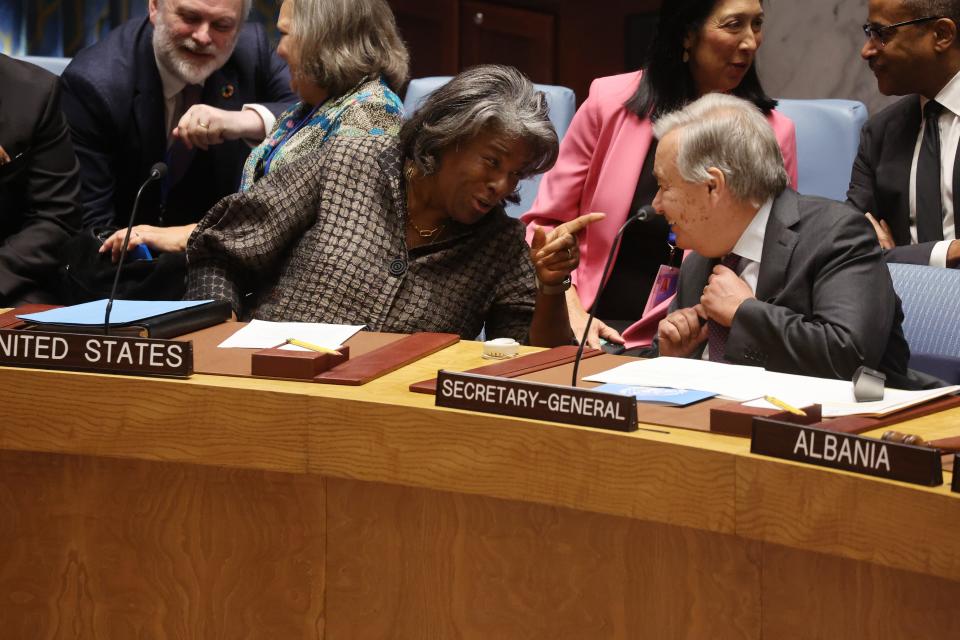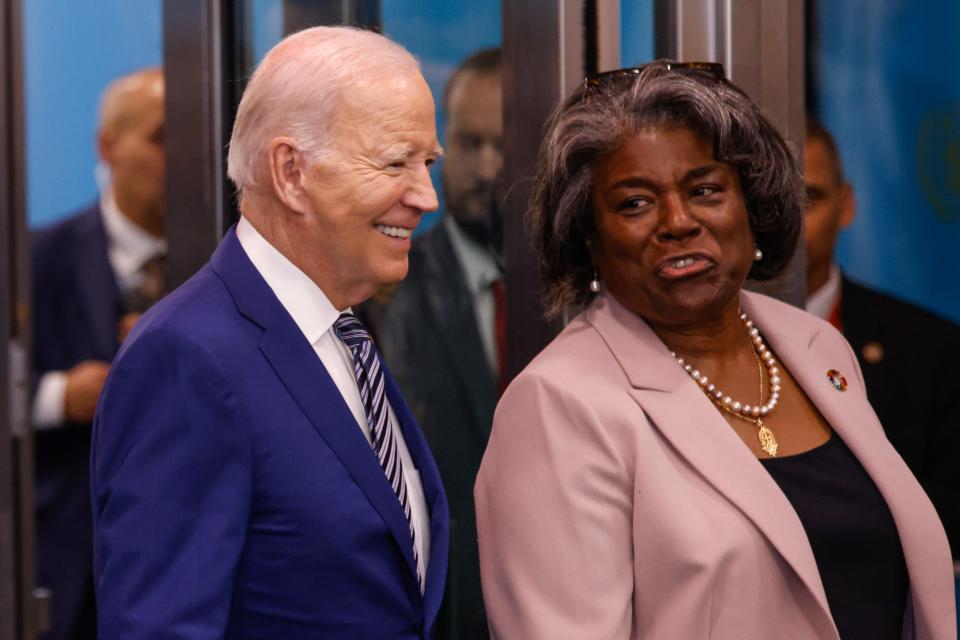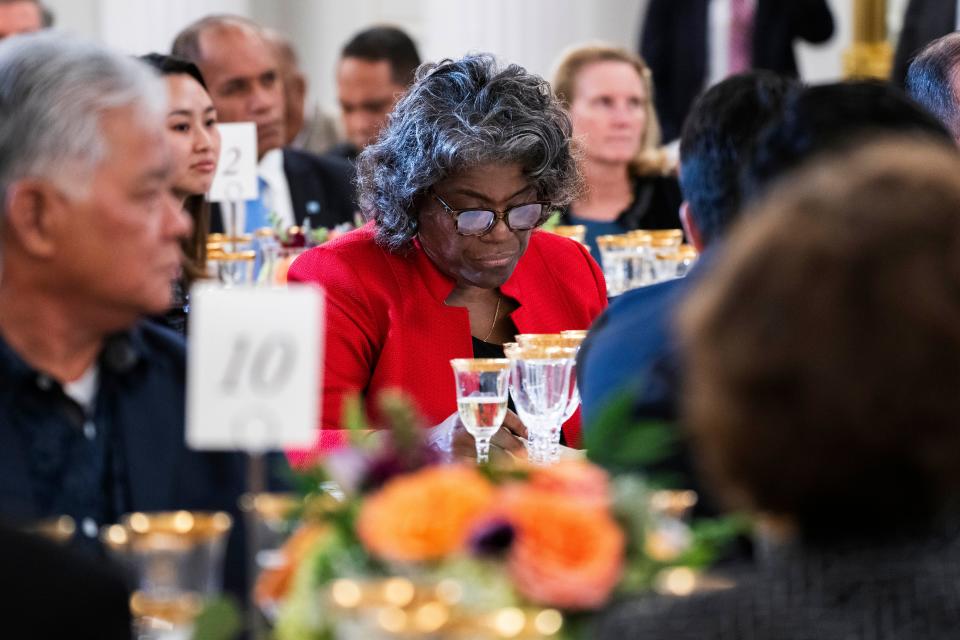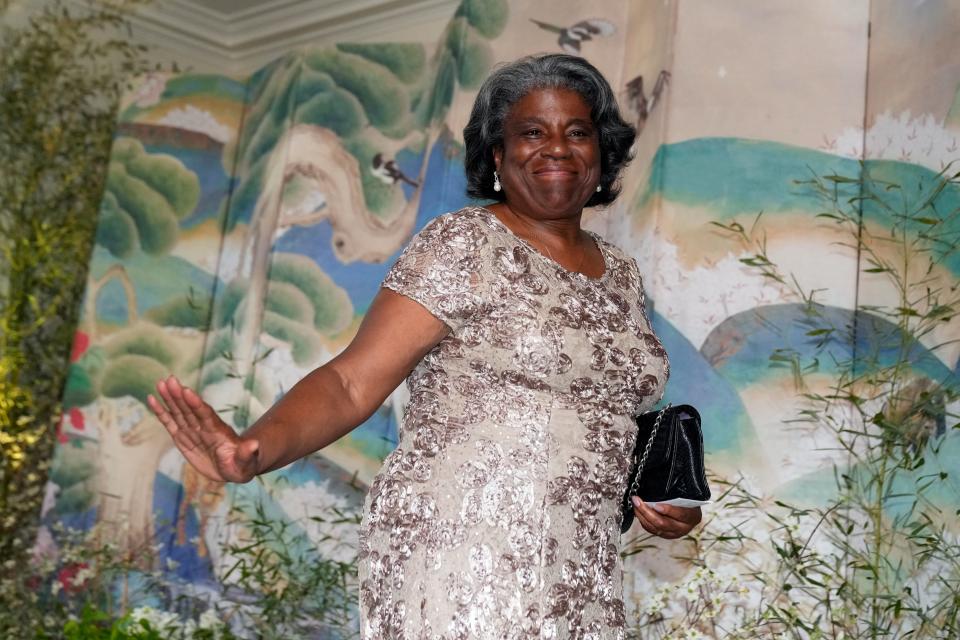Linda Thomas-Greenfield, US Ambassador to UN is recruiting the next class of Black diplomats
WASHINGTON – The assailant’s gun was in her face, his finger on the trigger. Linda Thomas-Greenfield believed she was about to die.
Thomas-Greenfield was staying, as a guest of a fellow U.S. official, in a house next door to Rwandan Prime Minister Agathe Uwilingiyimana. It was April 1994, and a militia uprising was about to trigger a genocide that would leave nearly a million people dead.
A Black woman, Thomas-Greenfield couldn’t possibly be an American diplomat, her captors decided. She was the person they were looking for: the prime minister. And they were going to execute her.
“In these guys’ minds, they were coming to the residence of an American,” Thomas-Greenfield told USA TODAY. “They expected to find white people, and they found me.”

She looked at the glazed-eyed young man and confronted the wrath of hatred with grace. She asked him his name. Then told him hers. “I don't know why I survived to tell the story,” Thomas-Greenfield said.
Thomas-Greenfield would not speak about the incident for many years. When she finally did, she recounted how she disarmed the man not with threats of American superpowers but a smile. “I brought out my improved diplomatic smile, that my mother had taught me and I would survive,” Thomas-Greenfield said in a TEDx speech in 2018.
She has spent a lifetime confronting the life-or-death nature of international diplomacy. And while most cases aren’t resolved at gunpoint, that night in Rwanda was not the first time – or the last – that she would be dismissed because of her race.
She’d grown up in the segregated South. At Louisiana State University in the 1970s, she was in one of the first classes forced to include Black students by court order.
She began her diplomatic career in 1982. But that night in Rwanda pushed her to something more. She wanted more new diplomats in the foreign service – people of color, women, Black women like her – to change the face of America the rest of the world sees.
Thomas-Greenfield did it with her own brand of “gumbo diplomacy.” It’s a term based on her actual gumbo recipe and style of inviting people to find common ground over a home-cooked meal, but one that also takes on a larger meaning: negotiation and power can be crafted in many ways, by people from many walks of life.
“On every level, I think that when we look at Ambassador Thomas-Greenfield, she's an extraordinary public servant. She's an extraordinary leader,” Vice President Kamala Harris said in an interview with USA TODAY. “She's always got a perspective on history, but her vision is always about the future.”
At age 70, Thomas-Greenfield remains among just a handful of Black women to reach the highest levels of American diplomacy. While her work is far from over, the larger diplomatic world now looks more like her than it did in 1994.
The foreign service had six Black ambassadors in 1986. Today, more than 25% of the State Department’s civil servants are Black.
When she was asked to lead President Joe Biden’s transition for its new State Department, she thought, perhaps, an ambassadorship would be on the table. But even she was surprised when Biden offered her the U.N. ambassador’s post – the most important one of all.

Learning diplomacy in Louisiana
Thomas-Greenfield didn’t learn diplomacy in Geneva or Washington, but by holding her mother’s hand on the walk to school in the small town of Baker, Louisiana.
Having only an eighth grade education, her mother reminded her, she could conquer the world in spite of adversity. Even if that meant she could only attend all-Black schools. Or that the Ku Klux Klan regularly burned crosses in neighbors’ front yards.
Thomas-Greenfield understood she had to set her sights high. That meant choosing to go to LSU, a university being forced to integrate instead of the historically Black college near her childhood home.
David Duke, a white supremacist and Klan leader, had a significant presence on campus. A world-renowned historian regularly used a racial slur in her class. One professor gave her an F. When Thomas-Greenfield asked him why, he told her, if you don’t know the answer to that question, you don’t need to be here.
She joined the foreign service in the early 1980s at a time when diplomacy was almost exclusively reserved for white and Ivy-League educated men.
There she would meet a transformative figure in her career: Edward Perkins, the first Black man to be U.S. ambassador to South Africa.
Gumbo diplomacy and growth of minority diplomats
Thomas-Greenfield started working for Perkins, a fellow Louisianan, as a staff assistant in the office of the director general of the Foreign Service.
Perkins would use his time in that position to develop a pipeline for low-income students, women and minority groups that have been historically underrepresented to become diplomats. The graduate program, known as the Pickering Fellowship, still exists today.
He had been the ambassador to Liberia and would go on to serve as U.S. ambassador to the U.N. – all jobs she would eventually have.
“He really pushed me to stretch beyond my own imagination of what I could achieve,” Thomas-Greenfield said.
A few years after her 1982 arrival, the State Department would face a class action lawsuit from Black foreign service officers. It was a daunting experience that opened her eyes to the adversity she would encounter later in her career as she sought to diversify the diplomatic ranks.
In time, Thomas-Greenfield would craft her own style of diplomacy. Her theory has always been that if you’re sitting over a good meal, then you can have a productive discussion and remain friends, even when there are disagreements.
“She is in some ways, a throwback,” said Mark Green, a former Trump administration official who worked with Thomas-Greenfield when he was U.S. Ambassador to Tanzania. “That was, in a bygone era, the juice of diplomacy.”

She’s brought her gumbo diplomacy to postings all around the world. She even cooked for former Liberian President Ellen Johnson Sirleaf. Her cooking isn’t solely reserved for dignitaries. Thomas-Greenfield’s kitchen table is also a place to foster the next generation of women and minorities.
“I think her love language is cooking, and it's something that she cares very deeply about,” said Kelly Razzouk, who was Thomas-Greenfield’s chief of staff at the U.N. until August and now works at the National Security Council at the White House.
One of Razzouk’s fondest U.N. memories includes a breakfast where she brought her 9-year-old daughter to Thomas-Greenfield’s residence.
A mother of two herself, Thomas-Greenfield helped the young women on her staff juggle the demands of being a parent with their jobs.
“One of the most inspiring things she told me was to say, you're doing a great job, Kelly. You're a great mom. And that was really, really touching for me,” Razzouk said.
Thomas-Greenfield has fought to change the perception of American diplomats as being “pale, Yale and male,” by traveling to historically Black colleges and universities to speak with students about opportunities in the State Department – even when her schedule was overloaded.
“We would sit there with her schedule and say: You're running from sunup to sundown; I'm not sure we can do this. And her consistent phrase to all of us was: I’ll find 10 minutes,” Razzouk said.
Those 10 minutes often turned to half an hour. “But she always was prioritizing finding that time,” said Razzouk.
Thomas-Greenfield has spent the past decade trying to realize an idea she put before senators when former President Barack Obama tapped her to oversee personnel: A foreign service that reflects the diversity of America, which she says is critical to the State Department’s work.
That legacy was in peril for a short period under the Trump administration – where ambassadorships held by Black diplomats dropped to a dramatic number: five.
When she stepped into her confirmation hearing for the U.N. wearing a purple tweed jacket, she addressed the committee saying her 35-year career “represents the progress, and promise, of America.”
Biden made the job a Cabinet position, empowering Thomas-Greenfield. She is one of four Black women in his Cabinet, but she is only the second Black woman to ever have her job.
Reflecting on the appointment, Harris said that Biden chose Thomas-Greenfield because he has the “utmost respect and confidence in her ability” to bring people together at a time of great challenges for the country and for the world.
“Make no mistake, she is there for a reason, at this moment in time,” Harris said.
Toe-to-toe with Russia and beyond
The moment to confront Russian Foreign Minister Sergey Lavrov had arrived.
This could not be another routine conversation of the U.N. Security Council, she promised. Too much was at stake. She could not ignore the elephant in the room: Russia had convened a meeting on multilateral cooperation.
Thomas-Greenfield unmuted her microphone. The brim of her blue eyeglasses sat on her nose with a grandma-like demeanor. Undeterred, she began to speak.
“This is a serious topic, even if it was convened by a council member whose actions represent a blatant disregard to the U.N. charter,” Thomas-Greenfield said alluding to Russia’s invasion of Ukraine and the illegal detention of American citizens.
She then whipped out a copy and turned to chapter one and began to read.
To boot, Thomas-Greenfield had orchestrated her speech alongside a special guest: the sister of Paul Whelan, the former U.S. Marine declared wrongfully detained in Russia.
Inside the chamber, Elizabeth Whelan stared down Lavrov.
“It was a very powerful moment,” Thomas-Greenfield said.
This is one of the creative ways to use her seat on the U.N. Security Council to advance American diplomacy, with officials from Russia and China using their permanent seats in the body to block her efforts.
She did it again in September, bringing in the family of detained Wall Street Journal reporter Evan Gershkovich.
“I can't change the fact that Russia and China sit on the Security Council, but I can, as a member of the Security Council sitting at that table, hold them accountable – expose their actions,” Thomas-Greenfield told USA TODAY.

Thomas-Greenfield’s reach has extended far beyond the walls of the United Nations.
She has had a significant role in the Biden administration's efforts to form closer relationships with developing nations and African countries with fragile democracies that China has invested heavily in.
Thomas-Greenfield was one of the first people the vice president called ahead of her March trip to Ghana, Tanzania and Zambia.
“I knew that I could call on her and get a very candid and clear perspective on how we should approach the continuing relationship that we have with African nations,” Harris said.
Watching Thomas-Greenfield take on the inherent hurdles of diplomacy with acuity and poise immediately struck one of her many mentees, Desirée Cormier Smith.
Cormier, who first met Thomas-Greenfield as a fellow in the Pickering Foreign Affairs program, went on to work with the ambassador in the Bureau of African Affairs.
Once, when they were in New York together for the U.N. General Assembly, Cormier saw heads of state run over and hug Thomas-Greenfield.
“After they’d walk away, I would ask, who was that? She’d say, ‘Oh, that was the president of such and such, I'm surprised that he still likes me because the last time I had to talk to him was a very difficult conversation,’” Cormier said, who is now the special representative for Racial Equity and Justice at the State Department.
That was gumbo diplomacy at work.
“She's able to deliver those tough messages with empathy and with humanity, people respect her. And they like her. And I think that's what makes her so effective,” Comier said.
As for how long she’ll be at the U.N., Thomas-Greenfield laughed. She, too, serves at the pleasure of the president.
But on that pivotal day in 2020 when Biden announced his national security team, she knew the late Perkins would have been proud.
“He passed away last week, but I know he’s with us here today,” Thomas-Greenfield said.
He had passed the torch on to her. As she stood with Biden, her work was far from over.
This article originally appeared on USA TODAY: UN Ambassador Linda Thomas-Greenfield on push for more Black diplomats

